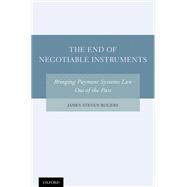
Note: Supplemental materials are not guaranteed with Rental or Used book purchases.
Purchase Benefits
What is included with this book?
| Preface | p. xi |
| Introduction | p. xiii |
| The Sorry State of Modern Payment Systems Law | p. 1 |
| Payment Systems Law in the Twentieth Century | p. 2 |
| What is Negotiable Instruments Law? | p. 7 |
| Why is Payment Systems Law Anachronistic? | p. 12 |
| What is the Anachronism: Negotiability or Negotiable Instruments Law? | p. 17 |
| The Puzzling Persistence of the Law of Checks and Notes | p. 19 |
| The Traditional Account of Negotiability | p. 21 |
| The Law of Bills and Notes in the Classical Era | p. 24 |
| Transfer of Bills and Notes in the Eighteenth and Nineteenth Centuries | p. 31 |
| Origins of the Myth of Negotiability | p. 39 |
| Paperless Paper | p. 45 |
| Reification and Documents of Title | p. 47 |
| Reification and Securities | p. 49 |
| Reification and Notes | p. 54 |
| Reification and Checks | p. 58 |
| Metaphor and Reality | p. 64 |
| Reports of the Death of the Holder in Due Course Doctrine are Greatly Exaggerated | p. 68 |
| The Demise of Holder in Due Course Doctrine in Consumer Sales | p. 69 |
| What was Really Wrong With the Holder in Due Course Doctrine? | p. 73 |
| Continuing Applications of the Holder in Due Course Doctrine | p. 77 |
| Mortgages and the Holder in Due Course Doctrine | p. 82 |
| What to Do about the Remaining Problems Caused by the Holder in Due Course Doctrine | p. 89 |
| A Visit to the Museum of Negotiable Instruments Law | p. 94 |
| Postdating and Antedating | p. 94 |
| Signatures by Agents | p. 96 |
| Alteration | p. 102 |
| The Bank Always Loses | p. 111 |
| Basic Principle of Loss Allocation | p. 112 |
| History of Check Collection Law | p. 125 |
| The Cost of Confusion | p. 134 |
| Are Checks Ever Transferred? | p. 146 |
| Check Transfer in Payment Systems Coursebooks | p. 147 |
| Check Transfer in Cases | p. 152 |
| Consequences of Confusion about Check Transfer | p. 163 |
| What Would a Modern Law of Promissory Notes Look Like? | p. 167 |
| Actions on Notes: Elements and Defenses | p. 167 |
| Presentment, Notice of Dishonor, and Protest | p. 170 |
| Renewal Notes | p. 176 |
| The Curious History of the Accommodation Party Provisions | p. 179 |
| Accommodation Parties and Guarantors | p. 187 |
| Suretyship Defenses | p. 192 |
| Promissory Notes are Just Contracts | p. 198 |
| What Would a Modern Law of Checks Look Like? | p. 200 |
| Indorsement of Checks | p. 202 |
| Lost or Stolen Bank Checks | p. 205 |
| The Unnecessary Complexity of the Check Collection Rules | p. 209 |
| The Unnecessary Complexity of the Check Fraud Rules | p. 216 |
| Impostors and Fictitious Payees | p. 221 |
| Checks as Payment Systems Law Rather than Negotiable Instruments Law | p. 225 |
| Overcoming the Past | p. 229 |
| Repeal, Revision, or Unification | p. 229 |
| The Lessons for Practicing Lawyers and Judges | p. 234 |
| The Lessons for Teachers of Payment Systems Law | p. 238 |
| Conclusion | p. 240 |
| Index | p. 243 |
| Table of Contents provided by Ingram. All Rights Reserved. |
The New copy of this book will include any supplemental materials advertised. Please check the title of the book to determine if it should include any access cards, study guides, lab manuals, CDs, etc.
The Used, Rental and eBook copies of this book are not guaranteed to include any supplemental materials. Typically, only the book itself is included. This is true even if the title states it includes any access cards, study guides, lab manuals, CDs, etc.